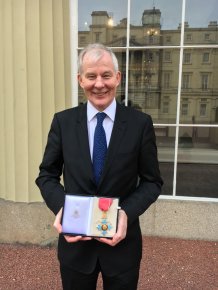Articles

Professor Andrew Hattersley received his CBE for his contributions to diabetes research
Exeter’s world diabetes expert awarded CBE
A world-leading diabetes expert today (Thursday 8th February) received his CBE for his work in revolutionising global diagnosis and treatment.
Andrew Hattersley, Professor of Molecular Medicine at the University of Exeter and a diabetes consultant at the Royal Devon & Exeter NHS Foundation Trust, was mentioned in the Queen’s birthday honours list last year following a string of international awards for his work in combining genomics research with clinical diagnostics to make a real difference in the sub types of diabetes across the world.
Diabetes occurs in different forms. In type the pancreas doesn't produce enough insulin or the body's cells don't react to insulin. It is the most common form of diabetes and can be caused by a combination of genetics and obesity and lifestyle factors.
In type 1, the pancreas does not produce any insulin. This is often caused by genetic mutation. It has several sub-types, which means treatments can be targeted accordingly
Professor Hattersley discovered that some babies with the sub-type neonatal diabetes – which is diagnosed before they are six months old - can be treated more effectively with a simple tablet than with daily multiple insulin injections. This discovery has changed international guidelines, and means the babies are at less risk of developing complications, resulting in a better quality of life for the infants and their families.
Professor Hattersley and his colleague Professor Sian Ellard set up their molecular genetics laboratory in Exeter in 1995, and built a team that has gained an international reputation for excellence. They have established a diagnostic genetic service that provides testing for patients, not only as the NHS centre in the UK but also for patients from 87 countries internationally.
Professor Hattersley said: “This amazing award reflects the work of all the Exeter Diabetes research team. It has been a stimulating and fun 22 years with the best team in the world, thank you!”
The team specialize in the sub-types of diabetes, including monogenic diabetes, which occurs because one of the three billion bases in a patient’s genetic code is altered. Trying to find the cause of this type of diabetes is like looking for one spelling mistake in a library full of books. Professor Hattersley and his colleagues in Exeter have found the single altered base in three billion for 15 different genetic types of diabetes.
Finding the genetic cause of the diabetes has led to the recognition of new subtypes of diabetes that have unique clinical features, with specific requirements for their treatment and clinical care.
Date: 8 February 2018
